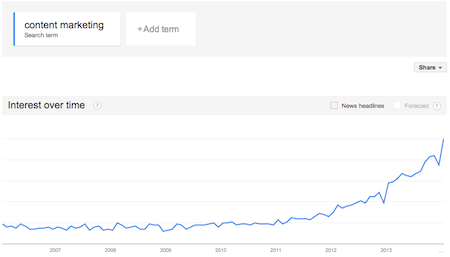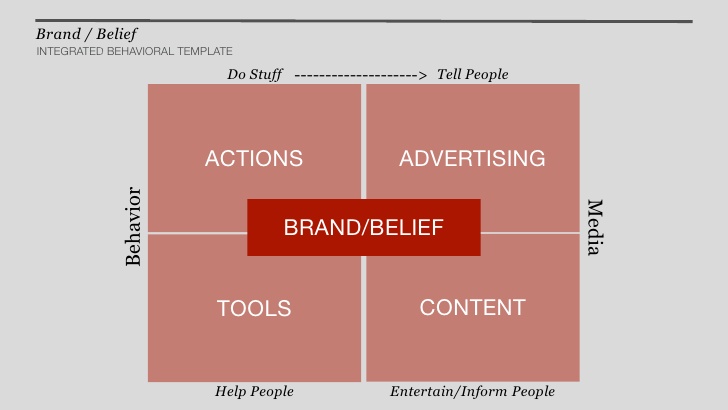My mate Jon tweeted me this video of Iain Tate and I rambling on in Romania from 2007. Good times. We were quite hungover, me moreso I think.
Iain looks almost exactly the same. I have more hair now. And, underneath, I look older. I imagine.
Content, the fight for attention, death of ads, marketing is the product, is the service.
Round and round we go. For such a long time.
I've been thinking a lot about this content and attention stuff recently.
For some Genius Steals clients, for some writing I've been asked to do, with some mates of mine in agencies who are thinking about it and wanted an opinion.
It seems to be the only conversation right now.
We started talking about it, this time around, in this form, because of the internets, I think, in about 2007.

It was presented as a threat to the industry, and I suggested that it would just cause evolution as we strove to find new ways to present the brand memes represent to audiences in new forms.
Later, I started thinking about business models, and how content works online in that context, and how advertising fits in, and suggested that shifting money into production, out of media, to make things people want to watch, might be a good idea.
Then it got all real-time for a while and suddenly everyone had a newsroom and was a publisher. (Which isn't a new idea, the brand as publisher bit, I mean. Guiness Book of Records. Michelin Guide. All original programs on television, before spot advertising was invented.)
Which is well and good, if a bit tiring if you try to keep the newsroom up, but my concern is that we just shifted from assuming advertising was the solution to all problems, to assuming content is the solution. Content is great, doing things that earn attention is a good idea - but opens us up to being in competition for attention with an infinite amount of content, made by everyone, of different qualities, from childish to professional. The solus function of most of this content is to aggregate attention, because this is the only measure of the 'quality' of any quantum of content. Attention is scarcer and scarcer everyday.
And making good, succesful content is super hard, otherwise every big movie and album would be a hit. But they aren't, because nobody knows anything, to quote William Goldman, about what the network will latch on to. There's a huge amount of randomness in the process of popularity.
That's why you have to adopt the portfolio model, make many, assume one out of ten will hit, and back it hard when you work out which one is gaining traction. Brand content has to navigate all that as well, and then precipitate some commercial impact after.
And maybe it does present a threat to the creative advertising industry, since, well, our other partners, the media companies that we've been buying attention from for all these years, also have a business model problem, and are really good at making content, fast, that is designed to attract attention.
And maybe, since there is so much content, brands can help solve that problem, or do something else, instead of adding their sticks to the stream. Strategy incorporates changes in the world, as fast as it can, and has to have a role in helping to decide what kind of solution migh best serve the brand, user, and objective.

Brand / Belief from Faris Yakob
Sometimes, no doubt, that is and should be content, or advertising. It depends on the need, the objectives, the situation. The internet promised to swallow the costs of reproduction and distribution - so we started thinking like dandelions, squeezing out lots of tiny pieces of content, all the time, to work into the content cadence of real people on these platforms. But, as Facebook has aptly demonstrated, we remain at the mercy of the algorithm of the stream.
So now we have to buy attention in the stream, just like we did before, except every stream is different.
Again, I'm all for content. This is not about hating content. That's silly.
I've been blogging and that here on TIGS for nearly a decade. It dips and rises, but I keep coming back, and it has, over the long term [and content/social is a long term play], been awesome, intellectually, socially, personally and commercially. [Remember: brands only care about the commercial bit though.] I didn't realize I was doing content marketing, or in-bound marketing, but I think I worked out a brand voice and content strategy and that.
I've made friends, met interesting people, got interesting opportunities that have taken me all over the world, scored a couple of jobs, co-wrote a book, and found a lot of like minded people who helped me think I wasn't going crazy, and from whom I have continuted to learn such a lot, for all these years. All, indirectly, or directly, from creating content. [Among other things.]
I just don't think content, or any thing, should be the only thing we consider, when looking to solve problems, or reach people.
And that, sometimes, the most awesome content, is just reportage of some really awesome thing you actually did in the world, like getting a guy to jump out of a satellite, or taking a stand on factory farms. And, because Iain is smarter than me, he got much further than the content conversation, in one leap, all the way back in 2007, to what Dan Hon and Russell Davies have been talking about more recently: the product is the service is the marketing. For digital things, the distinction has becomes super blurry, to use an old favorite word of Russell's.
And for non-digital things, marketing should be about making better products, and fixing stupid ecosystems, as well as making stories that stir the heart and get spread, which I believe will still be important, actually, because the collective intelligence of the internet is beyond any specific node's abililty to truly leverage, and anyway we make decisions that are rarely very intelligent, about what we buy.
And i understand, lord do I understand, that often our clients don't have access to the bits of the system that let's them change silly broken things. This is why, I think, we started making digital utilities and sort of products and that for clients, it was both a new way to earn attention, and a kind of workaround.
The true promise of this newly talking, broadcasting, collective of unique individuals that we call consumers, is being felt in the kinds of businesses that are being built in the stream, as it were.
And it is, I believe, entirely possible for legacy structured corporations to do similar things, if they can learn to take themselves a bit less seriously, and listen to people, and try to help their customers, putting customer satisfaction before the demands of the market [as much as possible, we can't be naive, but the business case will out eventually, and growth through cost reduction is ultimately a dead end, eventually], and allocate budgets accordingly, and incentivize staff appropriately, extrinsically and intrinsically, and all that jazz.
Because it feels like the kinds of things we can do, as an industry, with our hunger for beauty and usefulness, with our curiousity and creative tenacity, with our eye on culture and behavior and everything, for and with brands that do make awesome things, and do awesome things in the world, would just be more... awesome.
Y'know?
Read more from Faris in our Clubhouse.
